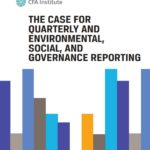Companies that publish longer environmental reports tend to earn more awards, companies in low carbon-intense sectors put out longer reports and almost all companies fail to define key sustainability terms, according to a study of corporate reports.
Admitting the variety of reporting methods and ways companies present sustainability information presents many limitations, communications consultancy Spada hopes its white paper, Environmental Reporting: Trends in FTSE 100 Sustainability Reports, spurs further research and discussion on sustainability reporting.
"Now is the time to develop a more rigorous consensus on how these issues should be communicated and appraised in the public domain," writes Spada managing director Gavin Ingham Brooke and research consultant Ana Catalano in the report.
Spada looked at reports from companies listed in the U.K.’s FTSE 100, examining terms and themes used and the report lengths.
Many corporations do not define important and frequently-used terms such as sustainability, clean energy and zero carbon. In the case of sustainability, 79 companies use that word, but only two define what sustainability means to them in the first instance.
By using a standard word count as a baseline for how long a page is, Spada calculated that the average report from FTSE 100 companies is 21 pages. Those companies that have won Business in the Community Top 100 awards averaged 25 pages, winners of Global 100 Most Sustainable Corporations averaged 26 pages and Carbon Disclosure Project Leaders averaged 30 pages.
For every 10-page increase in a sustainability report, the odds of a company winning an award increase 30 percent. However, Spada admits that its findings do not mean the length of a report is the sole cause of a company winning an award. Although Spada questions that hefty reports might be seen as meaning more than smaller, though possibly more substantive, reports, it does not investigate if the quality of reporting also coincides with report length.
Spada also found that companies in more carbon-intense areas do not communicate as much as companies in lower-carbon areas or companies that are more in the public eye.
Sectors that affect consumers tend to devote more writing to environmental issues than companies with lower public awareness, such
as those in metals and other industrial areas. Utilities and oil and gas companies, though, exhibit a better spread and depth of reporting, Spada says, than companies that face higher regulations or are less known to the public.



